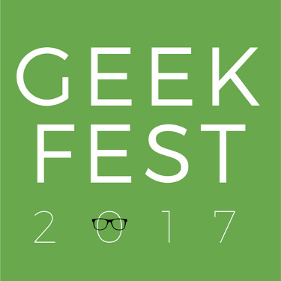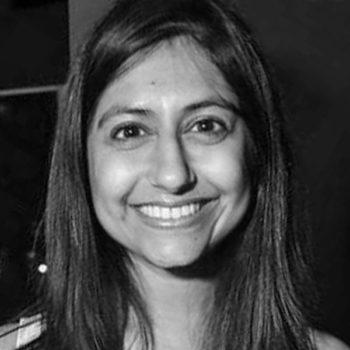Let us know what type of content you'd like to see more of. Fill out our three question survey.
GeekFest 2017: Discussing Blockchain and Economic IDs with Shailee Adinolfi of BanQu
Aug 15, 2017

Welcome to GeekFest 2017, a series of interviews featuring ICT4D thought leaders. Our goals for #geekfest2017 are: to highlight the people and organizations who are pushing the field in new directions, to feature their work and show how it’s different or new, and to support the overall growth of the ICT4D community.
This week I’m speaking with Shailee Adinolfi, Vice President, Account Management and Marketing at BanQu. We discuss blockchain technology and its application to finance and commerce. For an in-depth primer on blockchain technology, we encourage reading this article in the Harvard Business Review.
About BanQu:
BanQu provides Economic IDs (patent pending) to people, assets, and organizations or businesses on an Ethereum platform (aka blockchain) linking them to the global economy. We bring together important information about a person or business to create a portable Know Your Customer (KYC), including financial transaction history, health records, trust networks, small business registration IDs, assets/collateral, etc. and stores them in a secure “locker,” which they can leverage for increased access to financial services, employment, health care, or other services.

What are the origins of BanQu?
BanQu was conceived when our CEO, Ashish Gadnis, was working to implement Asili, a suite of social enterprises providing basic services and employment opportunities in the Democratic Republic of the Congo (DRC) as USAID’s volunteer Chief of Party. The need for alternative banking became clear when a woman in the program earned $200 from a harvest of potatoes, and Ashish accompanied her to the bank to open an account. Upon application, the banker said: “I can’t bank her, but I can bank you (speaking to Ashish).” Why? First, even though she was a respected business woman and community member she didn’t have a form of ID recognized by the government. Second, per DRC government policy, she was required to be accompanied by a male relative co-signee to open an account, start a business, or obtain credit.
That’s when Ashish decided to focus on making these underserved people visible in the new digital economy. One solution was to give them an economic identity which they own and can share with people for access to finance, employment, or business opportunities. Ethereum, a modern cryptocurrency platform built on blockchain technology, was the perfect platform.
What has BanQu seen to be the most promising areas for blockchain use in international development? What are the areas where you think there is more hype than real promise?
Two promising areas for blockchain and international development include 1.) last-mile visibility in global supply chains, and 2.) the creation of more inclusive commercial financial services. Additionally, it’s the potential for interoperable data at the user, service provider, and government levels, reinforced by some of the most well-regarded privacy and security systems.
In our experience, our partners, investors, and clients have difficulty separating the hype around blockchain from the reality of what they can accomplish in the near term. We have seen Initial Coin Offerings (ICOs) go to market without a credible service or product offering, and that has not served the distributed ledger technology (DLT) community well.
My advice to anyone interested in learning about blockchain solutions is to try using a DLT solution to solve one of your pain points. We need to reach scale as a community, and we can’t do it without partners who believe the potential transformational nature of DLT. Impoverished and underserved people have existed in the silos of databases for too long. It’s time to give them a way to package what’s happened to them, what they know, and who they know, in a way they can leverage for their advancement.
How have policies and regulations enabled or hindered BanQu’s blockchain development? Which countries are demonstrating a progressive approach to regulation?
Countries with a risk-based approach to KYC policies have enabled our work, such as Nigeria. The Financial Action Task Force (FATF), which is a global organization that sets standards and promotes effective implementation of legal, regulatory, and operational measures for combating money laundering, terrorist financing, and other related threats to the integrity of the international financial system, came out with guidelines that balance the need for anti-money laundering (AML) and combating the financing of terrorism (CFT) measures but also support financial inclusion for the un-underbanked.
How and what areas is BanQu working with national governments around the development of economic or other forms of identity? Which governments have shown the most interests? What are the hurdles to using blockchain for identity?
We aren’t working with national governments at this point, but may do so in the future. Ukraine, United Arab Emirates, United States, Canada, Colombia, and many more have expressed an interest in this type of technology. Governments around the world are exploring whether blockchain can solve some of their challenges, whether they be with the provision of services, or the creation of internal operational efficiencies.
How secure is BanQu’s platform? Can blockchain protect users from cybersecurity threats like the one faced by users, companies and the government in Ukraine today?
No technology is 100 percent secure. But at BanQu we have and continue to develop one of the most secure Blockchain platforms. Most of the successful blockchain hacks have been at the wallet level (like the parity hack) or through the intermediate database level (like MongoDB). BanQu’s proprietary platform is a private, permission-based, blockchain platform that doesn’t use a wallet or database. This insulates us from many threats. The core of our platform is the blocks, thus we have not been impacted by the hacks that you read about in the news. In addition, we have very robust checks and balances in place for assessing and preventing any attacks.
To follow BanQu’s story, tune into BanQu on Twitter @BanQuApp